IZIUM, Ukraine — The gas line was punctured by shrapnel. Plastic sheets now hang where the windows were. A single electric heat lamp is all there is to keep the home from freezing.
Halyna Zahorodnikh, who is 71, wears layers of fleece in the apartment to stay warm.
She is one of millions of Ukrainians facing a winter that's essentially being weaponized against them.
Russia's systematic and repeated attacks on Ukraine's energy and heating infrastructure — the latest of which involved the heaviest missile strikes in a nearly nine-month war — have led to regular power outages in some of the country's largest cities.
In smaller towns like Izium, where Zahorodnikh has lived all her life, electricity is intermittent and constantly threatened by the type of long-range missile and drone strikes that have become common over the last two months of Russia's war on Ukraine.
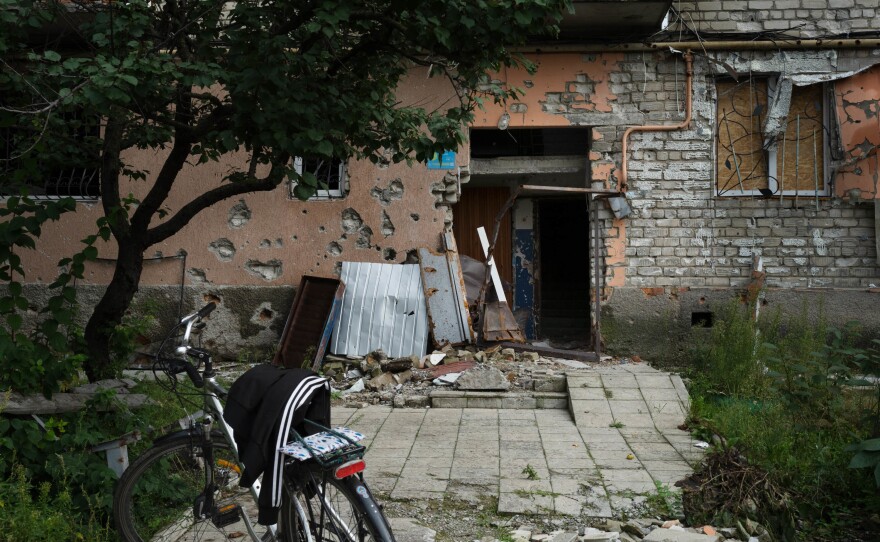
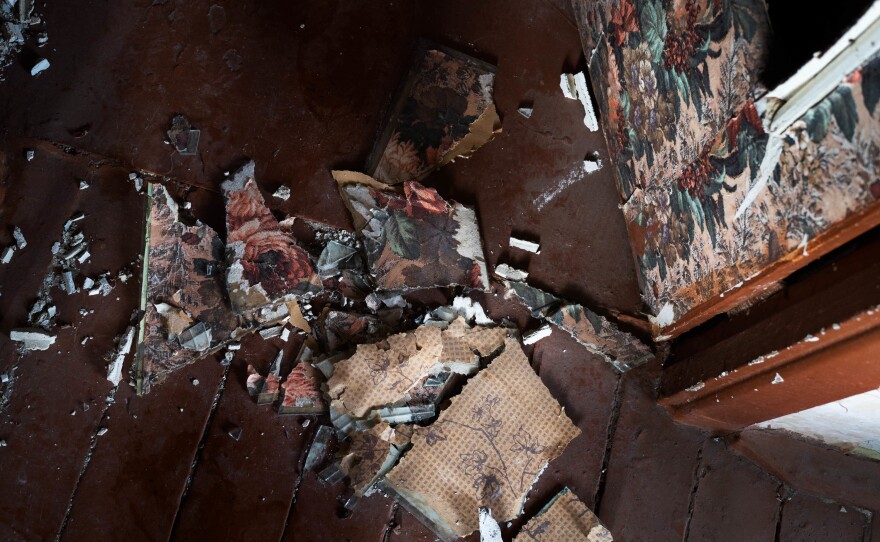
Following last week's widespread attacks, almost half the country's energy system has been disabled, Ukrainian Prime Minister Denys Shmyhal said at a meeting with the European Commission Friday. "Russia is trying to compensate for the losses on the battlefield with missile attacks on civilian critical infrastructure," he said.
Ukraine's energy ministry has been trying to repair damaged infrastructure as quickly as it can.
"Russia tries to destroy all of the energy supply chains. Generating facilities — especially thermal power plants — distribution systems and power lines," the energy ministry said in a written statement to NPR before the most recent attacks.
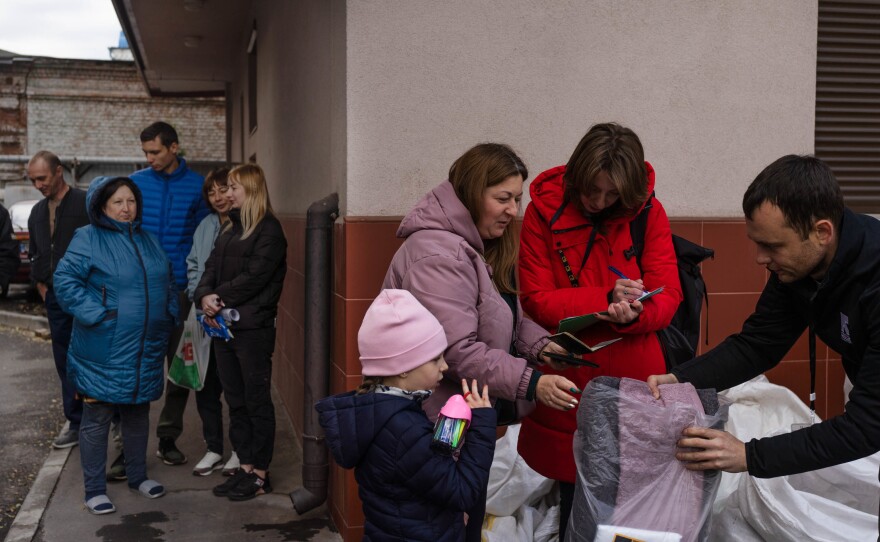
The attacks have left residents and businesses scrambling for gas-powered generators and firewood. Nonprofit aid organizations, the United Nations and Western allies have started to include winter clothing, thick blankets and heating equipment in shipments to the country.
"Should there be large-scale outages for long periods of time, we simply do not have the resources to provide people in need with the assistance they will need," says Marysia Zapasnik, the International Rescue Committee's Ukraine director. "The humanitarian situation will become much more dire than it is now."
The electrical heat lamp warming Zahorodnikh's living room was given to her by an aid organization. Donated blankets line her bed. She plans to stay for winter.
And if she loses power?
"I don't know," she says, with a stubborn smile. "Maybe I'll burn my books."
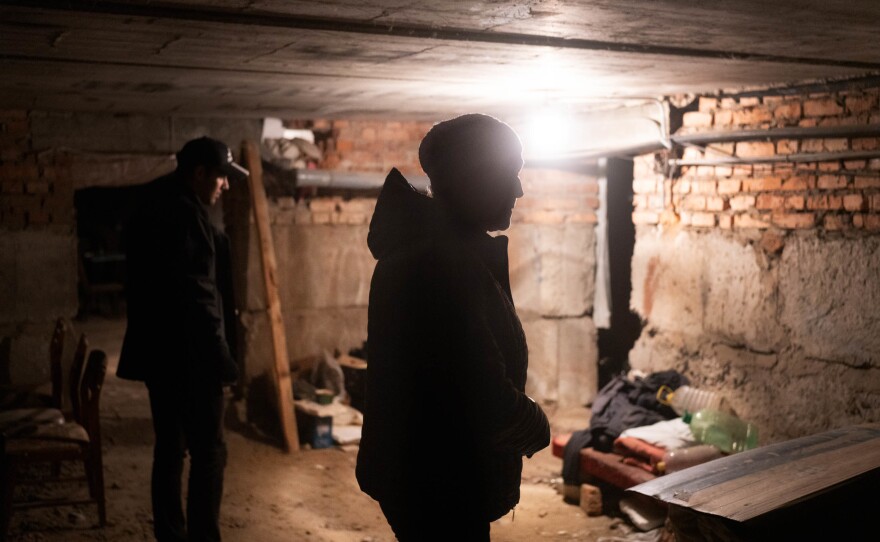
Russia targets Ukraine's ability to move energy
Russia has attacked Ukraine's heating and electrical infrastructure since the start of its nearly nine-month invasion.
As early as June, Ukraine's energy minister, German Galushchenko, told NPR that Russia was looking to weaponize the coming heating season with attacks on energy resources and facilities.
Many of Russia's early strikes, Galushchenko said, were aimed at power generating sources — thermal coal and gas plants. Russia also continues to occupy the largest nuclear power plant in Ukraine — and all of Europe — in the country's south. Ukraine gets roughly 60% of its energy from nuclear power stations.
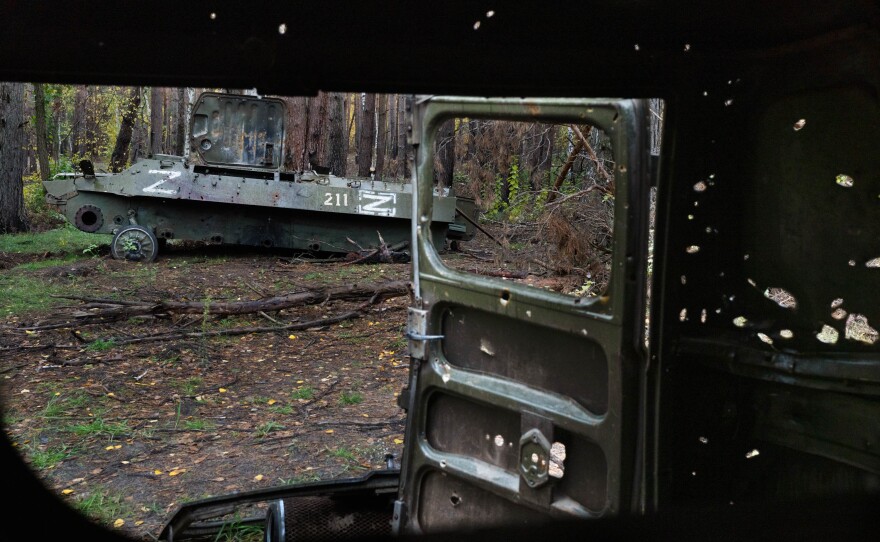
As of late October, the energy ministry says, Russian attacks have damaged about 40% of the country's thermal generation. Ninety percent of its wind power and more than 40% percent of its solar energy sources were either under occupation or damaged.
Many of Russia's more recent attacks have targeted the distribution systems, says DTEK, Ukraine's largest private power generator.
"These actions cannot be called anything other than energy terrorism and a brutal attempt to create a humanitarian disaster right in the center of Europe," DTEK says in a statement.
Attacks on substations and transformers limit Ukraine's ability to move power around and also its ability to import energy from Europe. They're also harder targets to defend against long-range attacks, says Oleksandr Kharchenko, the director of the Energy Research Center in Kyiv.
"I believe that Ukraine has enough [electrical] generation capacity," says Kharchenko. "Generation capacity has been better defended from the start of this war. But substations — there are a lot of them. It's not possible to cover each of them by special air defense [systems]."
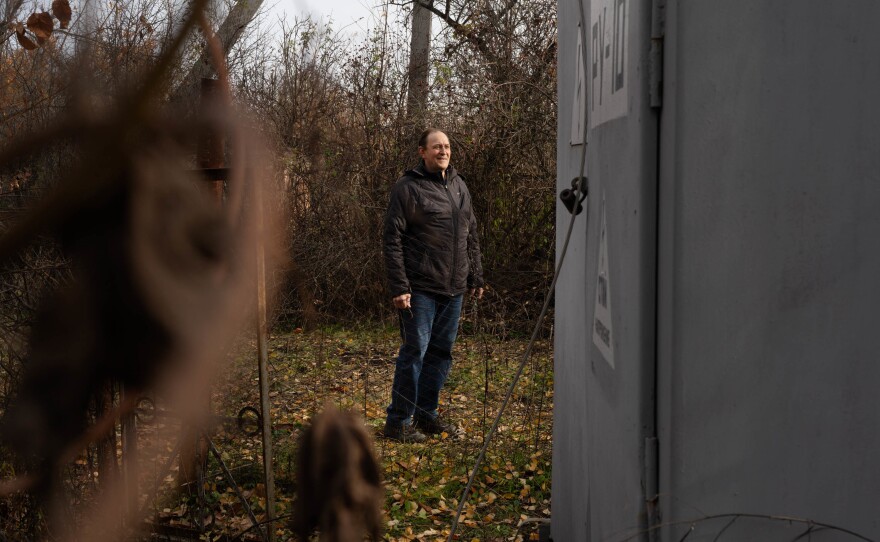
Ukraine races to repair its electrical grid
In a small village east of Kharkiv, where the sounds of artillery and tanks can still be heard like distant thunder, Mykhailo Voinov opens the metal door of a damaged electrical substation. A thumb-sized gash, from shrapnel, mars the door.
Voinov is an electrician who's been fixing damaged Ukrainian energy infrastructure.
"There's a lot of damage from shrapnel, but this one is the worst," he says, reaching into the substation and tapping on its main component, a ribbed cylinder-shaped transformer. It's empty, he points out. The oil from it drained through a hole from the shrapnel.
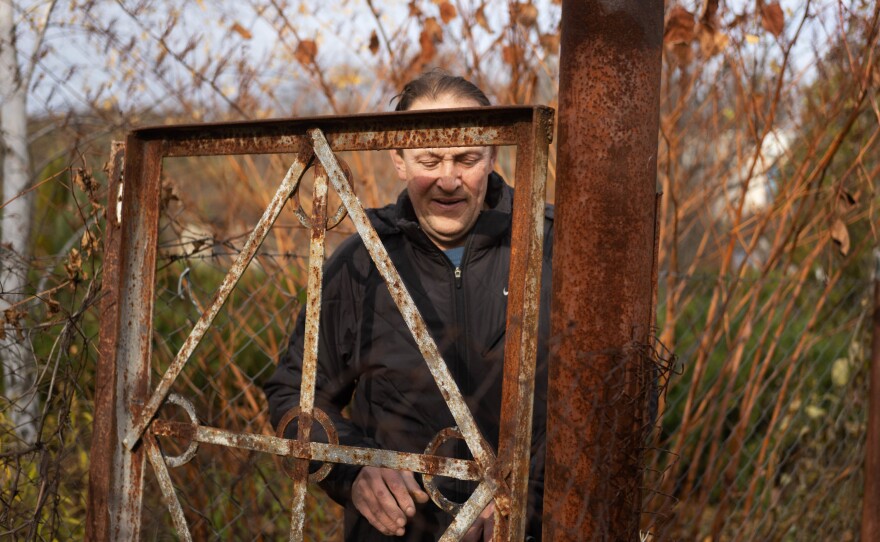
Fixing this one substation will cost thousands of dollars, Voinov says. Transformers, conductors and other components for electrical substations are in short supply. His team often has to wait weeks for equipment before they can make repairs, he says.
"Repair crews are working 24/7, without a day off, to minimize the length of emergency power outages," Ukraine's energy ministry says. Still, authorities are urging residents to conserve electricity, as much of the population prepares for a long winter with regular outages.
Voinov is among them. In a small village where his family owns a dacha, a summer cottage, power is expected to be out for months. Only a few residents, including Oleksandr Lysytskyi and his wife, Svitalana Maliarova, remain.
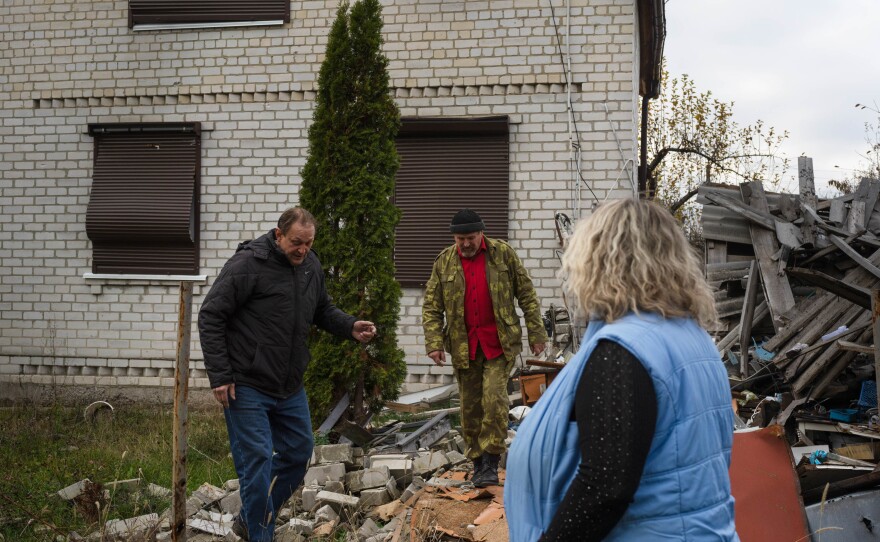
A crater from a Russian artillery shell that landed in their yard is filled with broken glass. They buried one of their dogs in another, Lysytskyi says.
Since Russian troops were driven out of the area in mid-September, Lysytskyi says, he's been trying to prepare his house for the coming winter. They're boarding up broken windows with plywood or covering them with plastic sheets provided by the United Nations.
A wood-fire boiler provides his home with heat. The wood, he says quietly, he's been collecting from the mine-riddled woods behind their house.
Lysytskyi and his family remained in this small village throughout Russia's occupation. They'll stay, he says, through the approaching winter.
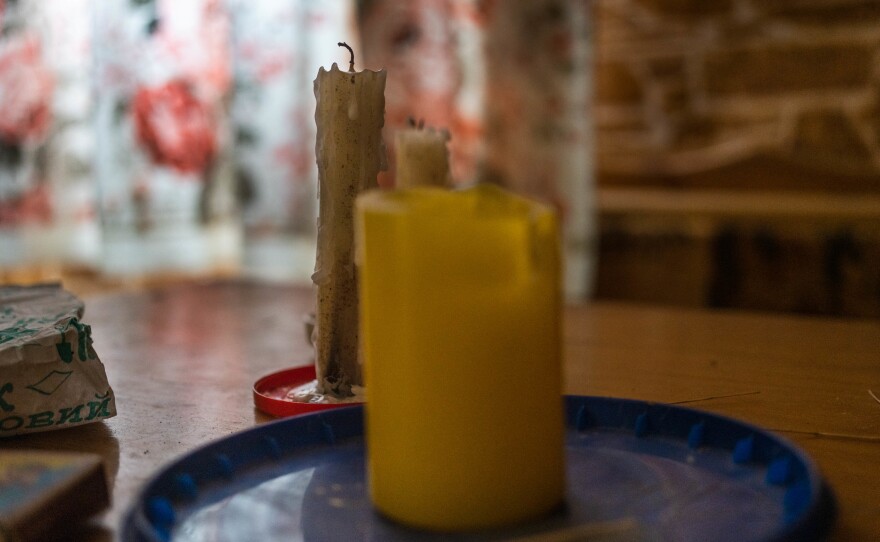
Millions of Ukrainians are expected to turn to firewood to heat their homes
Wood-burning stoves and boilers, like the kind Lysytskyi is depending on, have been in high demand across Ukraine. They're now so hard to buy that territorial defense units have taken to creating stoves by welding sheets of metal, for soldiers who will spend the winter in front-line positions.
The increased reliance on firewood has raised concerns from some environmental groups in Ukraine. Deforestation of the country's rich woodlands was a concern even before Russia's full-scale invasion. Last year, Ukrainian President Volodymyr Zelenskyy launched a Green Country Project, aimed at reforesting parts of the country with a million trees.
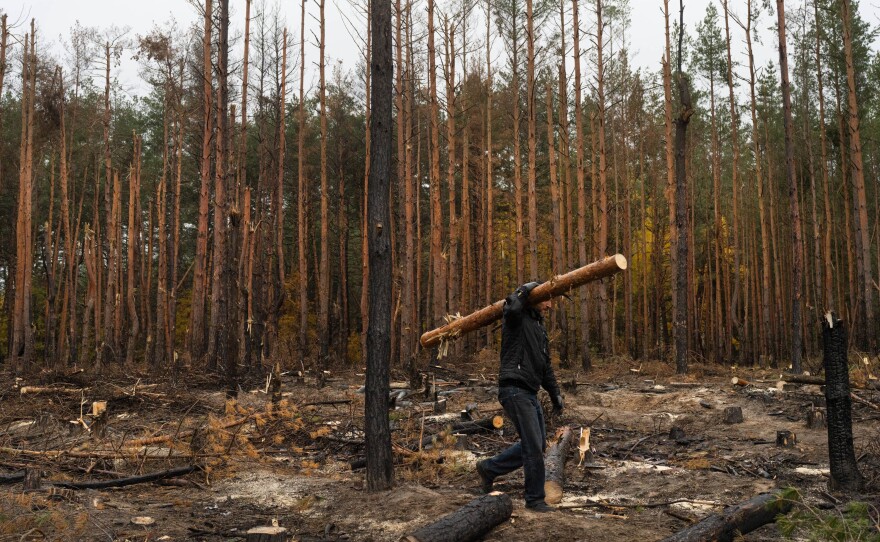
Since Russia's invasion, Ukraine's environment ministry has sent warnings to the public, making it clear that unpermitted logging is punishable by fines.
The need to protect undamaged forests is paramount, says Ruslan Strilets, the environment minister. "Because of the trenches, the explosions and fires," he says. "One-third of Ukrainian woodland has been damaged by war."
Strilets believes illegal logging won't be a major issue for the country over the winter — in part because the government has expanded a program to provide civilians with firewood to meet increased demand.
The state-run program gives residents the opportunity to buy up to roughly 530 cubic feet of firewood for the upcoming heating season. The government has more than doubled the amount of wood available for purchase, Strilets says, in anticipation of the increased need.
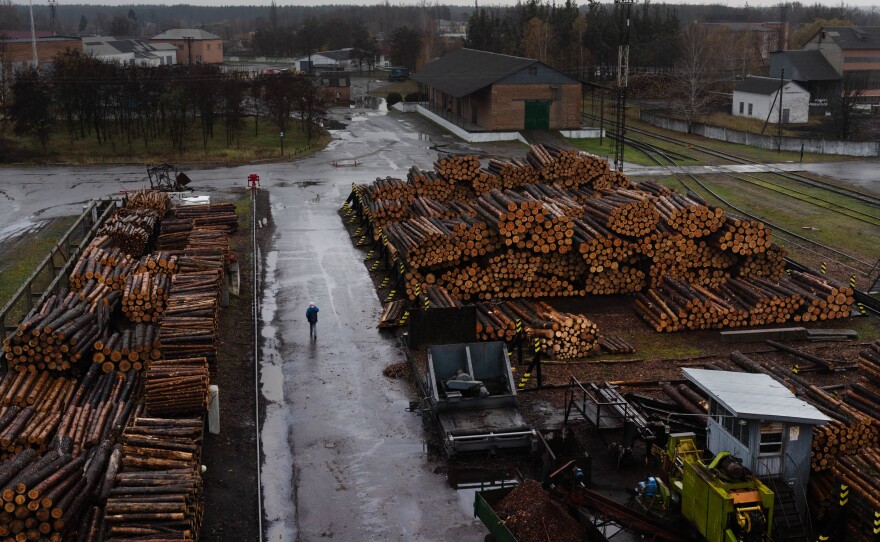
There are logistical issues to overcome though. Civilians need to be able to afford the firewood — a problem with the increased cost of everyday goods, like food and medicine. There are also concerns about delivery — how firewood will be transported to hard-hit places like Izium.
Bridges, roads and railways have been damaged across Ukraine and many people aren't prepared to navigate the bureaucratic process of getting wood purchased and delivered, says a resident of Izium, in far northeastern Ukraine. He prefers not to give his name because he's been illegally collecting wood for neighbors.
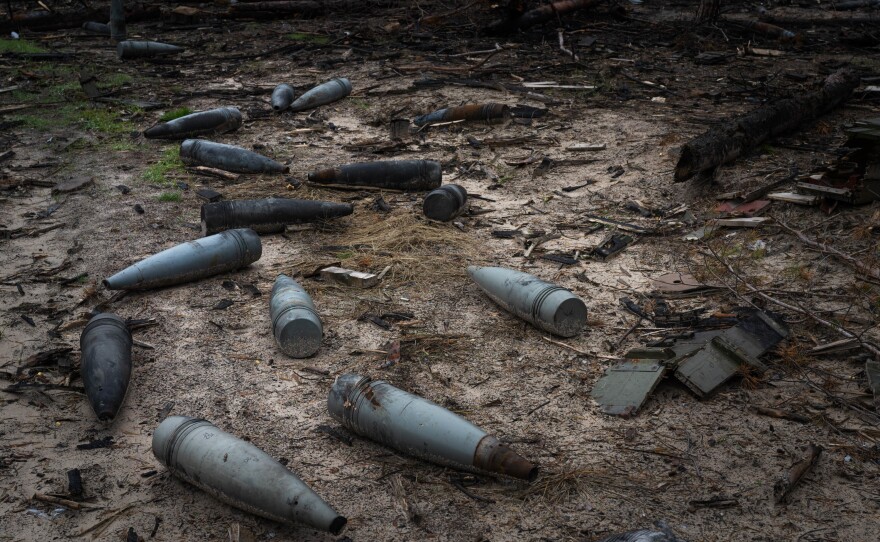
The man, a writer before the war, has been organizing other men to supply residents of the heavily damaged town with firewood. He's been collecting it in a burnt and torn woodland that the Russians had been using, before being driven out, as an ammunition storage site west of town.
"These trees will be cut down," he says, standing among spent Russian artillery shells. "The government will hire people and pay for this, but so far they haven't decided what to do and we have the chance to cut this wood for people who need it, and take it to them."
The work is dangerous. Unexploded ordnance litters the ground. Jagged metal is buried in the soft dirt. A local official tells NPR it will take years to demine the woodland, where residents like the man logging used to collect mushrooms.
Asked if he's worried about being fined or stepping on an explosive, the logger laughs.
"I think freezing temperatures are scarier than forestry."
Copyright 2024 NPR. To see more, visit https://www.npr.org. 9(MDAzMjM2NDYzMDEyMzc1Njk5NjAxNzY3OQ001))







